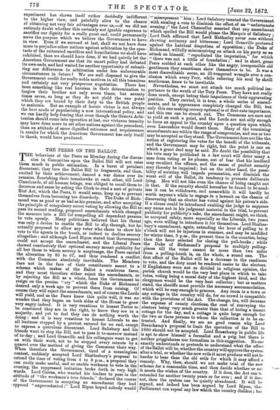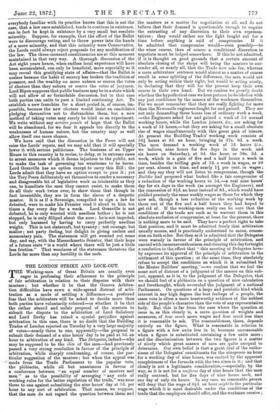THE PEERS ON THE BALLOT.
THE behaviour of the Peers on Monday during the discus- sion in Committee upon the Ballot Bill will not raise them much in public estimation. In a burst of petulant discontent, they tore the Ballot Bill to fragments, and then, excited by their achievement, danced a war dance over its remains, flourishing their tomahawks at each other, till Lord Clanricarde, of all human beings, was obliged to recall them to decorum and sense by asking the Clerk to read a sort of private Riot Act, which the Peers, it would seem, keep up to prevent themselves from becoming too disorderly. The Duke of Rich- mond was as good or as bad as his promise, and after accepting the principle of compulsory secret voting by allowing the Bill to pass its second reading, proposed amendments which changed the measure into a Bill for compelling all dependent persons to vote openly. Many politicians believed that his threat was only a device to enable the Bill to slip through, but he actually proposed to allow any voter who chose to show his vote to the agents in the booth, or indeed to decline secrecy altogether ; and although Lord Ripon stated that Government could not accept the amendment, and the Liberal Peers showed conclusively that optional secrecy meant publicity for all but those to whom secrecy is surplusage, the Peers carried the alteration by 83 to 67, and thus rendered a conflict with the Commons absolutely inevitable. The Members dare not in the face of their constituents assent to a scheme which makes of the Ballot a cumbrous farce, and they must therefore either reject the amendments, or by rejecting the Bill as a whole, force the Government to resign on the precise " cry " which the Duke of Richmond desired only a week ago to prevent them from raising. Of course they will reject the amendments, and of course the Lords will yield, and as the Peers knew this quite well, it was no wonder that they began on both sides of the House to grow very angry indeed. It is very vexatious to honest Tories to be convinced they are in the right, to know they are in a majority, and yet to feel they can do nothing worth the doing ; and it is very vexatious to honest Liberals to see all business stopped by a protest entered for no end, except to express a querulous discontent. Lord Salisbury and his friends want to stop the Bill, not to pass it to-morrow instead of to-day; and Lord Granville and his colleagues want to get on with their work, not to be stopped every minute by a quarrel over the method of giving the Commons their way. When therefore the Government, tired of a meaningless contest, suddenly accepted Lord Shaftesbury's proposal to extend the time of voting from 4 to 8 p.m., a proposal they can easily make useful, and so enable workmen to vote in the evening, the suppressed irritation broke forth in very high words. Lord Cairns, who wanted his leaders to pose in the attitude of "the workmen's true friends," declared the course of the Government in accepting an amendment they had
• opposed "unprecedented ;" Lord Ripon hoped nobody would
"misrepresent " him ; Lord Salisbury taunted the Government with stealing a vote to diminish the effect of an "unfortunate evening ;" the Lord Chancellor asserted that any amendment which spoiled the Bill would please the Marquis of Salisbury ; Lord Bath affirmed that Lord Hatherley never rose without showing acrimony and bitterness ; Lord Granville protested against the habitual despotism of opposition ; the Duke of Richmond, wilfully misconceiving an attack on his party as an attack on himself, "repudiated the imputation," for which "there was not a tittle of foundation ;" and in short, great Peers scolded at each other like the angry, irresponsible old gentlemen they sometimes show themselves to be. It was a most discreditable scene, an ill-tempered wrangle over a con- clusion which every Peer, while relieving his soul by shrill anathemas, knew to be inevitable. everybody familiar with its practice knows that this is not the case, that a law once established, tends to continue in existence, can in fact be kept in existence by a very small but resolute minority. Suppose, for example, that the effect of the Ballot were to discourage voting, and to throw power into the hands of a mere minority, and that this minority were Conservative, the Lords could always reject proposals for any modification of the law. The three-cornered constituencies are at this moment maintained in that very way. A thorough discussion of the Act eight years hence, when endless local experience will have been accumulated, can only be beneficial, more especially as it may reveal this gratifying state of affairs—that the Ballot is useless because the habit of secrecy has broken the tradition of pressure, and the wealthy no more suborn or coerce the votes of electors than they suborn or coerce the votes of jurymen. Lord Ripon supposes that public business may be in a state which will not allow of so formidable discussion, but in that case both parties can unite to pass a limited continuing Act. To establish a new franchise for a short period is, of course, im- possible, because the new electors would insist on candidates pledging themselves not to disfranchise them, but a new method of taking votes may surely be tried as an experiment. We write without any arriere pensee of hope that the Ballot will be abandoned, for we fear it appeals too directly to the weaknesses of human nature, but the country may as well allow itself one more chance.
We have said that the discussion in the Peers will not raise the Lords' repute, and we may add that it will specially lower it with serious politicians. The business of an Upper House in this country is to revise, to delay, or in extreme cases to arrest measures which it deems injurious to the public, not to make the task of governing too wearisome to be borne. Lord Granville has no option except to carry this Bill ; the Lords admit that they have no option except to pass it ; yet the Tory Peers deliberately set themselves to render a necessary and disagreeable bit of legislative work as intolerable as they can, to humiliate the men they cannot resist, to make them do all their work twice over, to show them that though in fact irresistible, they are in form the slaves of a despotic master. It is as if a Sovereign, compelled to sign a law he detested, were to make his Premier read it aloud to him ten times a day every day for a week. Lord Granville is not defeated, he is only worried with needless bother ; he is not stopped, he is only filliped about the nose ; he is not impeded, but only harassed by having to carry perfectly needless weight. This is not statecraft, but tyranny ; not courage, but malice ; not party feeling, but delight in giving useless and momentary pain. The statesmen will get wearied out some day, and say, with the Massachusetts Senator, that their hope of a future state "is a world where there will be just a little less friction." That weariness of the statesmen threatens the Lords far more than any hostility in the mob.



































 Previous page
Previous page